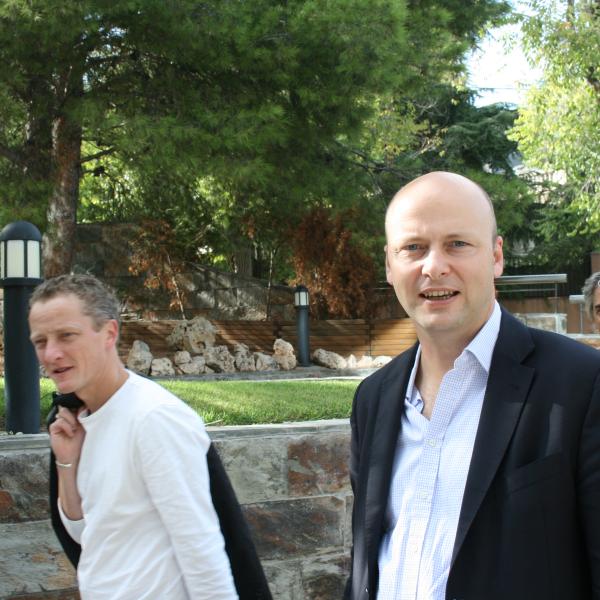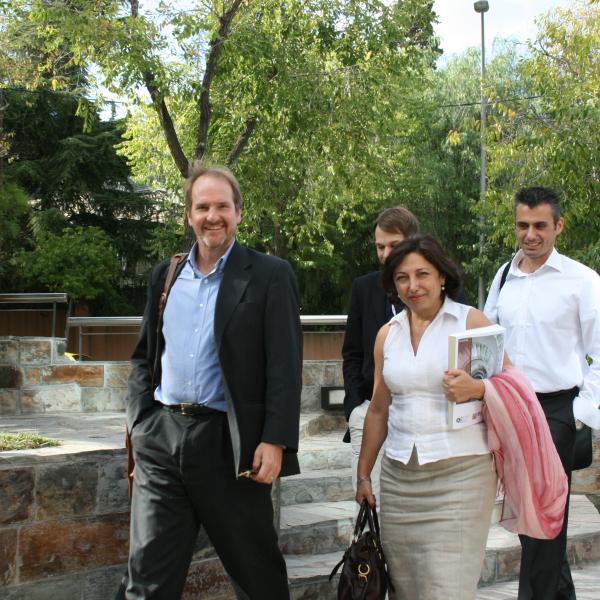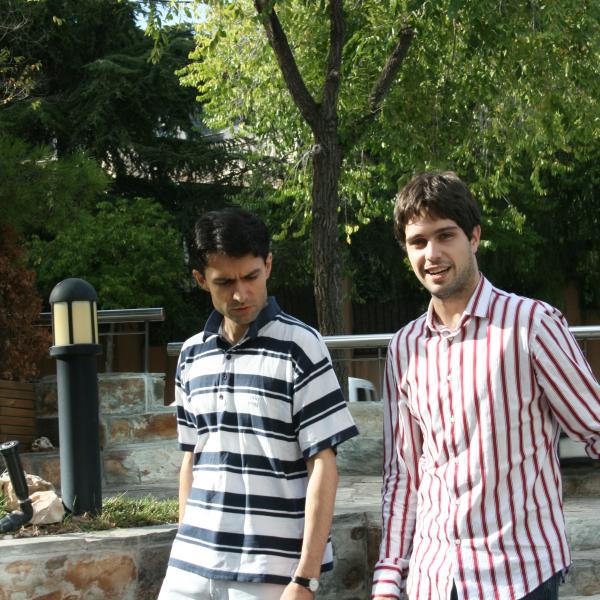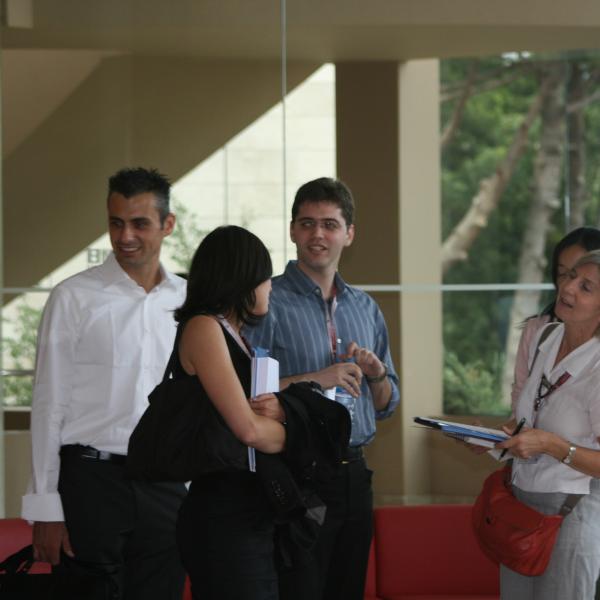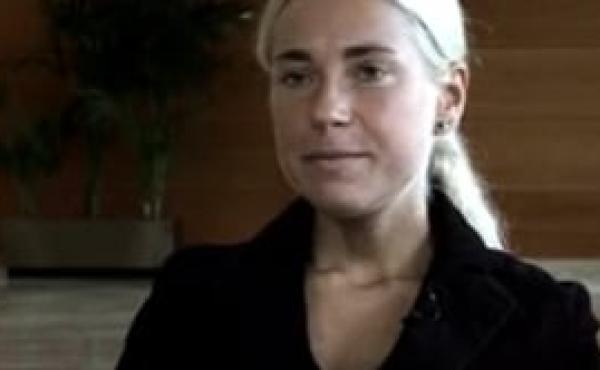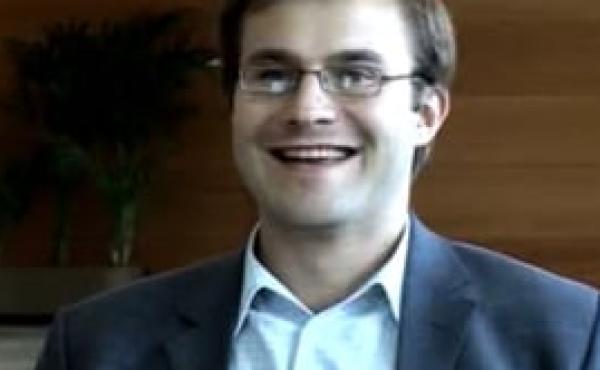European Corporate Governance Training Network (ECGTN)
Project dates: 2004 -2009
ECGI and CEPR organised a project to reduce the European research and training gap in corporate governance by bringing together Europe's leading academics and institutions from law, economics, finance, political economy and management to train doctoral students in conducting world class research in this area.

The European Corporate Governance Training Network (ECGTN) project was funded by the European Commission under the Marie Curie Research Actions. It lasted 4 years, starting in June 2004 and ending in September 2009. The Co-ordinator of the network was Marco Becht of the Centre for Economic Policy Research (CEPR).
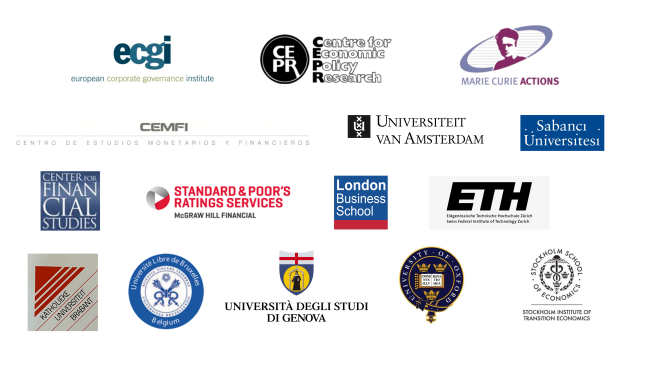
Background
Corporate governance scandals in the United States and Europe, some of which triggered the largest insolvencies in history, caused a crisis of confidence in the corporate sector in the early 2000's. As a result, corporate governance entered the vocabulary of not only of researchers but also of pension fund beneficiaries, employees of all ranks, chief executive officers and Prime Ministers. Improving corporate governance was then recognised in most countries and policy circles to have first-order macroeconomic consequences and become a mainstream concern. However, there were many research gaps.
Research Gaps
Research on corporate governance had expanded greatly prior to the project. However there were gaps in theory, data, empirical methods, and institutional aspects. Surveys revealed significant gaps in our theoretical understanding on some very basic issues.
For example, very little theoretical work had been done on the functioning of boards. Significant gaps also existed in research areas on the role of multiple stakeholders and on the dynamics of changes in corporate governance frameworks. Surveys also revealed large shortcomings in basic data at various levels for studying corporate governance.
Deficiencies in these data were hampering the deepening of knowledge on many issues relevant to corporate governance. Scholars elsewhere had been working to develop better data, but in Europe the collective efforts so far had been confined to the area of ownership and control. There was consequently need for more data initiatives.
Data gaps
- Firm level ownership and financial data, including direct and ultimate ownership data, covering both cash-flow rights and control rights;
- Comparable data on firms’ financial statements, including balance sheet and profits and loss statement;
- Data on firm stock market performance, including relative equity valuation and rates of return;
- Corporate governance actions by firms, including the composition of boards, the act of appointment of independent directors, the voluntary adoption of certain corporate governance charters and bylaws, the presence of incentive contracts for managers;
- Countries’ institutional frameworks, including detailed information on countries’ legal framework, various corporate governance rules, accounting and auditing rules and arrangements, structure and role of financial markets, setup of stock markets, detail on self-regulatory roles, and trading systems.
Methodological deficiencies
Studies to date suffered from some methodological deficiencies. Most empirical studies linking corporate governance quality to firm or economic performance suffered from reverse causality, endogeneity and/or sample selection problems. In some cases, standard results had been reversed when other econometric techniques were applied, for example when linking insider ownership to corporate performance. Methodological advances were needed.
Institutional differences and “natural experiments”
Clearly, institutional differences between countries and over time affect the nature and scope of corporate governance issues. While there had been a tendency to focus on institutional similarities, Europe had quite large institutional differences, many of which had not yet been documented. Surprisingly little attention had also been paid to the many “natural experiments” in the form of corporate governance reforms in many European and other countries over the past decade. Identifying both the underlying factors driving the reform changes as well the effects of the changes on economic growth and well-being would help guide reform.
In order to close the gap and advances in State of the Art methodology, ECGTN aimed to bring advances in several key areas.
Explanation of research gaps
Comparing the need of policy makers, industry and society for knowledge and competence on corporate governance with the available scientific evidence shows that there was a clear gap in Europe.There are a number of explanations for this absolute and relative shortfall in Europe:
- Few early stage researchers were trained in the area of corporate governance in Europe as few universities had the scale and skill to offer advanced level courses. The surveys revealed that a good portion of the pertinent research on Europe was conducted by early stage researchers working in the United States, confirming that research and training opportunities in Europe were lacking.
- Data availability in Europe was much more limited than in the US, making empirical research more complicated, suggesting a need for cross-country increased efforts.
- Research on Europe was more complicated because it must take into account a range of governance arrangements that are often rooted in local culture and language.
- Corporate governance research involves elements of economics, finance, management, political economy and law, disciplines that did not traditionally engage in joint training programmes. The ECGTN network features nodes in each of these disciplines.
The training experience was enhanced by inclusion of nodes from Turkey, Switzerland, Canada, and the United States, each contributing special expertise and training opportunities. The training experience was further enhanced by association with the European Corporate Governance Institute (ECGI) an interdisciplinary pan-European research Institute with a wide range of industry contacts, and the Centre for Economic Policy Research (CEPR), the longest standing "think net" in economics and finance in Europe. Together, ECGI and CEPR brought an even wider group of scholars and training opportunities to the network.
Closing the gaps
In order to close the gap and advances in State of the Art methodology, ECGTN intends to bring advances in each of these areas:
While there are many efforts underway to enhance the theoretical foundations of corporate governance, some of these lack feedback from practice and the interaction between various disciplines. Theory, and especially economic and financial theory, needs to take account of institutions, in terms of their impact and how they are created. While traditionally European legal theory is heavily based on insights from case studies, it is often formulated under the influence of sociology and philosophy and in isolation from finance and economics. By having representatives both from academics from a range of disciplines, and from industry, the network will produce the stylized facts that properly inspire new theories. The interaction between economists and legal scholars is expected to produce new theoretical insights in the financial area. The interaction of legal scholars with scholars from finance and economics will bring new theoretical approaches to legal thinking and introduce more quantitatively oriented methods.
The earlier collective efforts in the area of data on ownership and control have shown the possible gains from a European research network. Today, the need is for more data as well as for more synergy in data collection among researchers. While databases have become more easily available, many are not comparable across countries and are not necessarily available to a larger group of researchers. The network will build the means for greater exchange of data.
New empirical research will have to address important methodological issues, including the simultaneity and endogeneity of many measures impeding simple inferences about causality from correlations. More structural models will be needed, both at the level of the individual firm as well as at the level of the economy. The network will allow for interaction between researchers with a broad spectrum of backgrounds, including more quantitatively oriented economists and econometricians.
Institutional differences and “natural experiments”: Testing corporate governance theories requires differences in institutions or changes in institutions. Europe has both a wide variety of corporate governance systems and over the past few years a broad range of corporate governance reform has been pursued. A network operating on a European scale can document these differences, create new databases to capture these differences with their various subtleties, and become a global focus for the study of the causes and effects of policy changes.
Hence, ECGTN has the potential of closing the gap and advancing the international “state of the art”.
Workplan
The research and the training of the network will be organised around the four key themes of Corporate Governance. The research and training was based on establishing a solid foundation in empirical and theoretical analyses and collaborations between researchers based in different fields: economics, finance, management, political economy and law.
An important task of co-ordination was to provide an appropriate balance between activities by the teams on the different themes. Regular contact between the teams and network meetings was used as a means of achieving this. Moreover, yearly workshops were planned to discuss progress and to disseminate research results. The research work plan entailed the following allocation of tasks between the teams, distributed over the four different themes specified below (with designated teams responsible for the sub-tasks of each theme).
Project Management
The Co-ordinator of the network is Marco Becht of the Centre for Economic Policy Research (CEPR). He is assisted in his management of the network by a Network Steering Committee.
Day-to-day project management
CEPR, through its day-to-day management of the network activities, acts as the co-ordinator of the reporting, co-operating fully at all times with other institutions on matters of decision making, and serves as the conduit for the network teams to develop planning by consensus or any shorter-term contingency plans if required. In this way, a certain degree of autonomy will be given to each team with which to use its funds, once they have been disbursed by the co-ordinator, for its training expenses and for other costs related to the research training-related transfer of knowledge activities as envisaged by the network as a whole.
Budget management
CEPR will monitor the costs incurred by each team periodically based on the reporting requirements laid down by the Commission and advance any monies to the teams based on their level of expenditure at regular intervals.
Dissemination of Research
Both CEPR and ECGI will disseminate research, which will be achieved initially via the circulation of research results in the CEPR Discussion Paper Series. This will ensure the work of the network receives the widest possible professional scrutiny, both in the research and the policy communities. On average 500 copies of each Discussion Paper are circulated throughout Europe and the rest of the world. CEPR Discussion Papers are also abstracted widely, and can be downloaded in full from the CEPR web site to which the project web site will be linked. CEPR will also take responsibility for establishing and managing the Network’s own website, which will add to the accessibility of the research produced by the teams. In addition, highlights of the network's research will be featured in its newsletter European Economic Perspectives, which is distributed to over 14,000 members of the policy community and the private sector worldwide.
ECGI publishes Working Papers through its two series on Law and Finance, and these are available free of charge from the Social Science Research Network (SSRN). It also publishes several books. Overall, its research output features prominently on www.ecgi.global, which currently ranks as second most visited web site on www.google.com when searching for "corporate governance”.
Transfer of Knowledge
CEPR and ECGI will organise and administer the network's Transfer of Knowledge events and the final conference, which will involve participants in the project, as well as other members of the European research community and senior policy-makers. CEPR will organise and administer the academic conferences scheduled for months 19 and 43 (the latter being the final conference); the research workshops planned for months 11, 22, 34; and the summer schools for months 14 and 38. The final conference will aim to summarise the key results of the project and to examine the policy implications of the research. It may be that the Centre will publish the papers presented there as a conference volume or policy paper if funds allow for this.
ECGI will be responsible for organising all the other ToK events: the two academic conferences taking place in months 7 and 31, and the two research workshops scheduled for months 22 and 46.
ECGI – Management of the Industry Training Programme
ECGI will use its existing links with the industrial nodes in the network to facilitate their integration into the Transfer of Knowledge activities and to supervise the Industry Training Programme through which they will provide training opportunities for the ESRs hired by the network training nodes. Specifically, ECGI will:
• liaise with and act as the network’s point of contact for the industry nodes throughout the duration of the contract
• arrange meetings of team leaders/ ESRs’ mentors with industry node representatives
• facilitate and supervise placements for ESRs at the industry nodes
• foster collaboration between training and industry nodes and ensure the participation of the latter in network management and Transfer of Knowledge activities.
Methodology
The project will use the latest lines of research that are being pursued in regard to both theoretical and empirical analysis of corporate governance. It will draw on new areas of research in the field of economics, finance, management, political economy and law. It will exploit the rich endowment that Europe possesses in the field of corporate governance reflecting its diverse institutional, legal and political structures. It will also draw on the varied historical evolution of corporate governance systems. It will therefore utilise these cross-sectional differences across countries and time, as well as between institutions and firms within countries.
The first line of research involves providing training in relevant theoretical tools. There have been considerable advances in the modelling of corporate governance arrangements drawing on principal-agent, imperfect information and incomplete contract models. These have broadened our knowledge of the relevance of corporate governance systems and the different instruments of corporate governance. However, there remains a great deal of theoretical modelling to be done.
As one illustration, the recent corporate governance failures in the U.S. have pointed to the failure of intermediary institutions, such as accountancy firms, credit rating agencies and investment analysts, in providing appropriate monitoring of corporate activities and performance. There are a variety of causes that have been suggested ranging from the inadequate access to information of these agencies to collusion and corruption. It is critically important that we improve our understanding of the way in which different institutional arrangements operate and the factors that promote good corporate governance.
A critical element of the corporate governance network will be to provide students with tools to undertake theoretical analysis at the frontiers of research. They will develop skills in game theory, contracts and incomplete contract models. In addition they will develop an understanding of current research which is being undertaken in, law, finance and political economy modelling.
The second line of research is empirical. There are two aspects to this. The first is to assemble relevant data sets on corporate governance, institutional structures, legal systems and political institutions. Several of the principal academics are leaders in this line of research and have gained considerable experience in undertaking both cross-country and single country data collection. There are some relevant data sets that are available on companies and financial institutions but there is also a pressing need for data on particular aspects of corporate governance.
An example of this is the extent to which institutions are active in Europe in initiating corporate actions against poorly performing management. There has been much study of the role of institutions in corporate governance in the US but little is known about how equivalent institutions in Europe compare. The links to industry and financial institutions will be invaluable in assisting in such data collection.
Linked to this is the empirical analysis of the data sets. As previously indicated, a problem that many existing studies have encountered is one of causality and exogeneity of the data. There are, firstly, econometric techniques that provide methods for testing and correcting for endogeneity. Secondly, there are differences across countries and across time in Europe that can be exploited to great advantage to evaluate the impact of exogenous influences on corporate performance. Examples are the institutional reforms that have recently occurred in transition economies and during the course of the twentieth century in Western Europe. Such approaches have already been used in a study of the impact of institutional change over the twentieth century on the ownership of corporations. It is therefore intended that students in this programme will develop expertise in the design and assembling of large data sets and in the application of the latest econometric techniques.
Integration of Complementary Methods
A distinguishing feature of the network and the research programme is its multidisciplinary approach on the interface of economics, finance, management, political economy and law. This will be reflected in the type of data that will be collected. We intend to combine information on corporate governance, ownership and control of firms with data on the legal and political structure of economies. There are already some international data banks that can be used and we will supplement them with more detailed information on individual countries. The type of data that we have in mind include descriptions of changes in the regulatory rules relating to disclosure of information, anti-director provisions, and rights of shareholders and creditors. Such detailed analysis has already been undertaken for the UK and in the process it has revealed some significant insights on the link between law and corporate governance.
One aspect of this insight comes from the substantial structural break that occurred in the UK in the middle of the twentieth century. There was a marked shift in regulation from a largely unregulated to a heavily regulated capital market in the second half of the twentieth century. This shift has allowed researchers to evaluate the way in which regulation affects patterns of ownership and control of corporations. There is considerable opportunity to apply such techniques to the study of evolution of corporate governance in other countries. This area of the evolution of the corporate governance and control of corporations is one of the most interesting current lines of research and it extends the interdisciplinary approach to business history. It provides students on the network with training in the use of historical sources of information.
There has been much discussion of the policy reforms that are required to overcome the failures of corporate governance observed over the last few years. Many reforms have been proposed and one of the primary objectives of the network will be to evaluate the appropriateness of different proposals. The diverse institutional and regulatory structures in Europe provide a rich basis for evaluating these proposals. In particular, we already have information on such factors as the structure of boards, the representation of independent directors and the separation of chairman and chief executive officers of companies in different countries. We will use this to evaluate the range of policy proposals that are emerging from different countries and the European Commission concerning corporate governance reforms and takeover proposals. The analysis will give students basic insights into how to evaluate policy reforms.
In addition to econometric analyses and large data set studies, the research will involve detailed case studies and clinical papers. For example, in the context of the evolution of ownership and control to which reference was made above, much insight came from looking at specific cases. Students will therefore gain training in case study writing as well as large data set analysis.
Although there are some links with an existing RTN on ‘Understanding Financial Architecture: Legal and Political Frameworks and Economic Efficiency’ (funded under the Fifth Framework Programme), there will not be duplication of research and training activities proposed by this network. This previous network has been highly successful in training and developing researchers in areas of applied finance economics with research produced on various aspects of the analysis of law, institutions, and their impact on economic efficiency. ECGTN will train researchers in areas related specifically to corporate governance.
Shareholders and Takeovers
Led by University of Oxford with the following main project focus areas:
The Evolution of Ownership and Control
Previous research had shown that there is a great variety in ownership and control arrangements across countries. This diversity sparked a lively debate and in order to understand the reasons for such differences, it was felt that one had to go back in time and look at the evolution of ownership and control in parallel with the evolution of economic growth, regulatory reform and politics. This research examined the evolution of ownership and control. In addition to research at four training nodes (ECARES, Oxford, LBS, SITE) in this area, the network benefitted from the expertise of Randall Morck at the Alberta node, Ailsa Röell at the Princeton node and Mark Roe at the Harvard Law School node.
Institutional shareholder activism
Institutional investors playing the role of “active owners” were widely believed to prevent and correct corporate governance failure and to improve corporate performance. However, independent scientific research had not produced conclusive evidence that institutional shareholder activism leads to change or better investment performance. On the contrary, an extensive body of research showed that “shareholder activism” in the United States was not effective. The “negative” studies for the United States have several potential shortcomings that might drive the results. These shortcomings could be overcome in the European institutional context. The project was undertaken by researchers from Oxford, LBS, ULB and benefitted enormously from links with the Hermes industry node, one of the largest activist pension funds in Europe.
Shareholder power and remedies
Legal researchers focused, inter alia, on measures that empower shareholders and shareholder remedies. While shareholders have the right to vote on certain structural changes such as mergers, disposal of substantially all assets, dissolution, as well as on capital increases and decreases and appropriation of parts of the corporations profits (in some jurisdictions), they frequently lacked the power to get these issues on the agenda for shareholder meetings. Thus, the exercise of the voting power that statutes and articles confer upon shareholders are, as a rule, dependent on a proposal being submitted by the directors. Whether this predominance of the board needs to be cut back by giving shareholders more power to set the agenda of shareholder meetings was a question that merited further examination from a legal as well as from an economic perspective. The rules on shareholder remedies against illegal corporate or shareholder actions as well as the opportunity to challenge the validity of shareholder resolutions vary significantly in continental and common law jurisdictions. A comparative legal and economic study could shed some light on the question if and to what extent shareholders should have the right to take an active part in controlling corporate affairs and how such rules should be designed in order to prevent the types of abuse we’ve encountered in Germany with respect to the right to challenge shareholder resolutions.
Boards and Executive Motivation
Led by Università degli Studi di Genova with main project focus areas:
Clinical study of Telecom Italia
The Genova node's link to the Telecom Italia industry node provided a unique research opportunity for network researchers. Through the Genova node, researchers had direct access to the legal, economic and financial aspects of public company management. In particular, the researcher was able to focus on issues, such as board appointment, composition and functioning, directors’ independence, organization by committees, internal controls, executive remuneration, depending on the topics chosen for research. The training included comparative law issues considering that the company is listed both on the New York Stock Exchange and the Italian Stock Exchange and is therefore subject to Italian and US law (including the recent Sarbanes-Oxley Act regulating the governance of companies listed in the US). In addition, the researcher was able to attend the financial department of Telecom Italia, including its investor relation department, in order to develop a better understanding of the financial aspects of corporate governance and the relationships between management and institutional investors.
Board practices in Turkey
The Sabanci node worked on this area by looking at current board practices in Turkey and at the transition to professional management in family firms.
Board reforms
Regulatory responses affecting boards that resulted from the recent corporate governance scandals. The scandals triggered substantial amounts of legislation seeking to prevent an abuse of managerial discretion by implementing a variety of rules ranging from requirements of committees staffed with independent directors to whom important decisions are assigned to additional liability being imposed on directors. Some of these rules, particularly a number of procedural requirements with which corporate decision making has been burdened, were designed rather hastily and gave the impression of political reactions aimed at restoring public confidence rather than dealing reasonably with the core issues. One of these core questions certainly seems to be how to strike the right balance between the traditional concept of imposing and enforcing strict fiduciary duties (which might foster risk aversion) and the concept of aligning shareholder and management interests by tying directors’ remuneration to the success of the company (which may, as we have witnessed, foster excessive greed). This issue, particularly a closer examination of what influence the different mechanisms of controlling managerial behaviour have on executive motivation and how remuneration plans should be fashioned could be helpful in designing more effective laws while repealing unnecessary and burdensome rules.
Debtholders and Multiple Constituencies
Led by Center for Financial Studies (CFS) with main project focus areas:
Risk shifting and corporate governance
The Frankfurt node investigated risk shifting and corporate governance in the new markets for asset securitization. The rapid development of securitization markets in traditional bank-dominated financial system, such as Germany, France and Italy, posed challenging questions to observers and policy makers. Three major questions were dealt with in this project: First, what determines the contractual forms chosen in the securitization of loans and other financial assets? Second, under what conditions will there be liquid markets in these new instruments, and what are possible institutional and legal obstacles? Third, to what extent does the expansion of securitization lead to changes in the allocation of risk in the economy? All three questions entailed the combination of empirical and theoretical work. Results contributed to an understanding of the ongoing change in corporate governance in Europe, relating to the strengthening of market processes in an otherwise bank-dominated financial landscape. The project also involved the participation of industry representatives from investment banks active in arranging CDO issues, and from rating agencies.
Corporate law and bankruptcy codes
The LBS team studied the influence of corporate law and bankruptcy codes using a sample of small to medium size distressed companies from three countries, France, Germany and the U.K. The results of the study were used to examine how differences in the legal environment affect the outcomes of distress, for example the incidence of default and bankruptcy and recovery rates for creditors. The project also focused on the issue of how these differences in outcomes affect the firm’s pre-distress capital structure, provisions and design of debt contracts, and interest rate margins. Using a time series of company defaults from banks in the three countries, it examined how outcomes of distress vary across different stages of the business cycle within a country and across countries. Large differences in bankruptcy codes may result in very different bankruptcy outcomes and costs of distress.
Institutional Aspects, Regulation and Policy
Led by Universiteit van Amsterdam (UvA) with main focus areas:
Corporate governance and EU Company law
This project looked at defaults regimes for EC Company Law. The research focused on how corporate law decision makers should choose the legal default rules that govern corporations in Europe. A comparative project looked at US and EU Takeover Law Regulation asking to what degree the US and EU legal regimes regulating takeovers are likely to converge. The project also looked at freedom of choice in EU company law.
Political economy of corporate governance
This project focused on the political decision that determined the degree of investor protection. It examined whether entrepreneurs and workers can strike a political agreement by which low investor protection is exchanged for high employment protection, and how this 'corporatist' agreement is feasible. The project also examined the relationship between employment protection and M&A activity. A clear understanding of the nature of this political decision is a key factor in the effective promotion of economic growth and productivity.
Ratings and Surveys
The evaluation and rating of Corporate Governance and the associated analytical framework was a newly emerging area of research. Major index providers and exchanges were exploring the launch of indices that include companies considered to uphold high standards of corporate governance. Some countries had chosen to develop national governance rating methodologies (Greece, Germany etc) whereas international rating agencies conduct governance ratings based on international standards (Standard & Poor’s, Fitch, Deminor etc). These developments required a better understanding of the effectiveness of the existing analytical approaches as well as exploration of how governance rating methodologies could be standardized to help better inform investors. At Sabanci, researchers worked on an investor survey on Corporate Governance in Turkey making use of global surveys which explored the opinions of investors on what matters in making investment decisions. The surveys provided useful and practical insight to the market value associated with better governance.
Project Activities

TCGN Final conference
11 - 12 September 2008
Hosted by IESE Business School, University of Navarra, Barcelona, Spain
Academic conference in conjunction with the Corporate Governance Best Paper Competition
This competition was co-organised by ECGI, the Review of Finance and the Swedish Centre for Business and Policy Studies (SNS). The conference was hosted at University of Oxford.
Summer school: Corporate Governance and Capital Markets
12 - 19 Aug 2007
The CFS Finance Summer School 2007 was organised jointly with ECGTN. Topics included the role of mergers, acquisitions, restructurings and venture capital and private equity in corporate governance; corporate governance and shareholder value.
Financial Contracting: Theory and Evidence
20 - 21 April 2007
The conference was organised by the University of Mannheim, the Journal of Financial Intermediation, ECGI, the German National Science Foundation, and the Center for Financial Studies.

Summer School
12 - 21 June 2006
CIFRA-University of Amsterdam hosted the 2006 Summer School.
Academic (inaugural) network conference
28 - 29 Jan 2005
Hosted by Saïd Business School, University of Oxford. View Programme.
Corporate Governance Standards and Financial Stability
9 September 2008
The 2008 Transatlantic Corporate Governance Dialogue conference focused on two themes: Corporate Governance Standards and Financial Stability. It took place at the Charlemagne Building, Brussels, Belgium.
ECGI Annual Conference - IESE Business School
11 April 2008
The ECGI Annual Lecture was given by Professor Luigi Zingales, Robert C. McCormack Professor Entrepreneurship & Finance, University of Chicago Graduate School of Business. His presentation "Board Elections : Is Italy a Model for the Rest of Us?" and the panel discussion that followed were conducted under the Chatham House rule.
Conference on Contractual Corporate Governance Deviations from National Standards
22 June 2007
Read the Conference Report here. A one-day symposium was held on 22 June 2007 at the University of Sheffield on the topic of contractual corporate governance.
ECGI Annual Conference 2007
18 - 19 April 2007
A keynote speech 'The New Vote Buying' by Prof. Bernard Black was followed by an Oxford Union-style debate on the motion “This House believes that long-term shareholders should have double voting rights”.
ECGI Conference 2006
9 - 10 March 2006
The ECGI Conference in Zurich included a lecture on "Corporate Governance and Behavioural Finance" by Professor René Stulz and a debate on the motion “This House believes that company top executives should be paid like government ministers”.
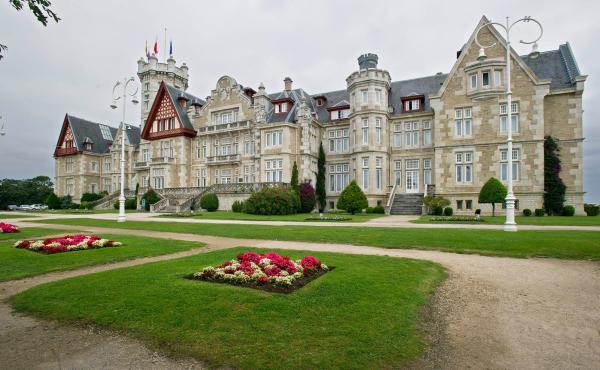
Summer school: Corporate Governance: Economic, Financial, and Legal Perspectives
11 - 15 August 2008
Hosted by International University Menendez Pelayo, Santander, co-organised with Centro de Estudios Monetarios y Financieros (CEMFI).

Academic workshop: Shareholder Rights, Shareholder Voting and Corporate Performance
21 - 22 March 2008
Organised by University of Amsterdam Center for Law and Economics, the Amsterdam Center for Corporate Finance, the University of Cagliari and the Law and Business Program of the Vanderbilt University School of Law, and hosted in Sardinia, Italy.
Workshop: How to get Published in Top Finance Journals
21 June 2007
The workshop was aimed at early career researchers and advanced PhD students from the European Corporate Governance Training Network (ECGTN) and other UK and overseas universities. Read the Report.
Academic workshop Mid-Term Review
14 - 16 September 2006
Presentation of activities and projects within the ECGTN by junior researchers (PhD students) and by the cluster leaders to a representative of the European Commission. Presentation of research by senior members of the ECGI. Presentation of research papers and research ideas by the ECGTN PhD students.

Early stage researchers meeting and Christmas dinner
15 Dec 2005
Hosted by ECARES, Université libre de Bruxelles.
ECGTN Participant Interviews
